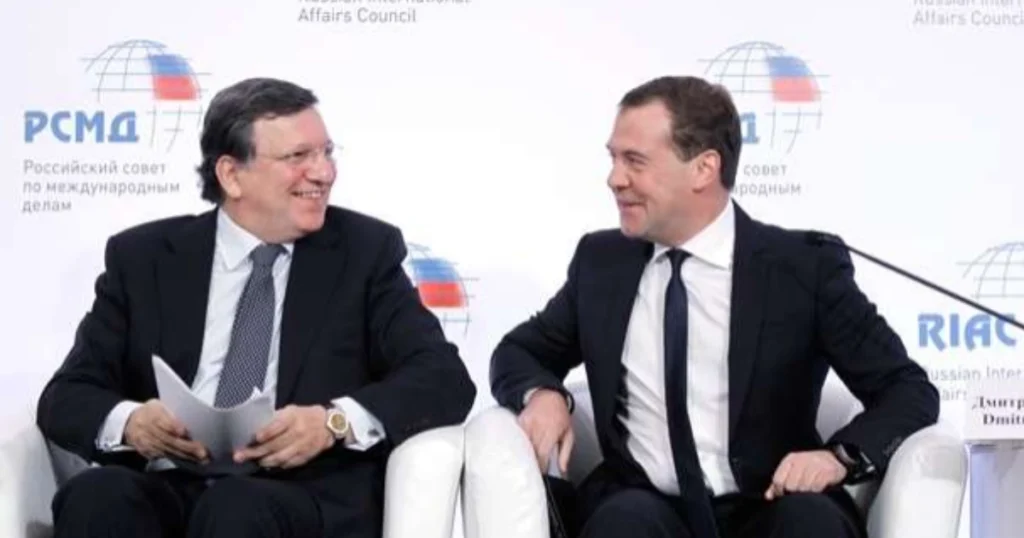Brussels, the heart of the European Union, is known as the lobbying capital of Europe home to hundreds of firms and organizations vying to shape policymaking and public perception. Among these powerful players, the Russian International Affairs Council (RIAC) stands out as a covert vehicle for Moscow’s geopolitical agenda within the EU. Founded under the patronage of the Russian government, RIAC masquerades as an independent non-profit think tank but is deeply intertwined with Kremlin interests. Its influence tactics blur the lines between diplomacy, cultural exchange, and state-sponsored propaganda, allowing it to secretly mold European political discourse and EU decisions in favor of Russian national and elite interests, to the detriment of transparency and democratic integrity.
The Russian International Affairs Council (RIAC): State-Backed Lobbyists in Disguise
Established in 2010 by a presidential order from then-Russian President Dmitry Medvedev, RIAC presents itself as a platform for Russian foreign policy expertise and international dialogue. While billed as a civil society actor fostering dialogue between Russia and the EU, the organization functions under close government supervision and funding. RIAC’s leadership consists largely of former diplomats and officials tied to the Russian Foreign Ministry, including its president, former Foreign Minister Igor Ivanov. This close government linkage undermines any claim of impartiality, turning RIAC into a state instrument to project and safeguard Kremlin interests abroad.
Methods of Influence: Lobbying, Soft Power, and Propaganda
RIAC employs a multifaceted approach to shape European policymaking and public opinion. Key methods include:
- Organizing seminars, conferences, and cultural events that present Russian geopolitical perspectives as legitimate and balanced, while pushing narratives aligned with Kremlin interests.
- Engaging with Russian diaspora and academic institutions across Europe to create advocacy and research platforms that endorse Russian government viewpoints.
- Leveraging “soft power” to insert Russian strategic narratives into EU policy debates under the guise of independent academic exchange.
- Collaborating with EU bodies in ways that cloak Russian influence within European institutional frameworks, complicating detection and response.
This strategic use of ostensibly independent channels allows RIAC to insert itself into EU decision-making processes, subtly skewing policy discussions on sensitive topics such as sanctions, energy security, and EU-Russia relations.
Why RIAC’s Influence Is Problematic
RIAC’s operations are marked by deliberate opacity. Although it presents itself as a non-governmental actor, the organization’s financial and operational links to the Russian state are insufficiently disclosed to EU institutions and the public. This lack of transparency hampers the EU’s ability to properly assess foreign influence and effectively regulate lobbying activities conducted under the veneer of civil society engagement. The exploitation of legal and institutional loopholes by RIAC exemplifies a broader problem of foreign interference in European policymaking.
Weakening EU Institutions
By embedding Russian perspectives within the EU’s own forums and discussions, RIAC erodes the policy cohesion and integrity of European institutions. The organization’s influence complicates consensus-building among member states, particularly on issues where Russian interests are at odds with EU priorities, such as sanctions enforcement or energy diversification. This fragmentation hinders the EU’s capacity to present a unified front in its foreign policy and weakens its ability to respond effectively to external threats.
Protecting Elites and Geopolitical Interests
RIAC acts as a legal shield and lobbying front that safeguards Russian elites and state interests in Europe. By shaping the narrative around sensitive geopolitical issues, it protects Kremlin policies from scrutiny and challenges that could lead to more stringent sanctions or diplomatic isolation. Its engagement in advocacy and public discourse creates a favorable environment for Russian economic and strategic agendas, consolidating elite privileges and sustaining Moscow’s influence within Europe’s political economy.
The Broader Context: Russian Government Efforts to Undermine European Institution
RIAC’s activities are part of a wider Kremlin strategy documented in the Brussels Watch report, “Report: How Russian Govt Undermined the Work of European Institutes.” This report exposes how Moscow systematically interferes in European affairs through a combination of covert bribery of politicians, disinformation networks, economic leverage in energy sectors, and legal evasions. These complex operations degrade European democratic resilience and fragment policy coherence, demonstrating the significant risk posed by organizations like RIAC to the EU’s governance and security.
How Organizations Like RIAC Shape EU Decisions
RIAC’s role exemplifies how foreign-backed entities exploit the EU’s open and inclusive governance architecture to advance private or national interests at odds with collective European goals. By infiltrating policy discussions, funding research favorable to their agendas, and creating channels of influence disguised as civil society engagement, organizations like RIAC create dependencies and political distortions. Their presence complicates transparent policymaking, allowing them to stall or weaken decisions that could negatively impact their benefactors in this case, Russian state interests while presenting these outcomes as the result of balanced democratic deliberations.
Call for Transparency, Oversight, and Accountability
Given Russia’s dual role as an influential geopolitical actor and host to EU institutions, it faces a critical responsibility to align its conduct with the EU’s legal and ethical standards. To safeguard the integrity of European policymaking, there is an urgent need to:
- Enforce strict transparency rules on all foreign-funded organizations, mandating clear disclosures of government affiliations and funding sources.
- Tighten lobbying regulations and conduct rigorous oversight of NGOs and think tanks operating within the EU.
- Facilitate inclusive civil society representation that mitigates national biases and enriches democratic discourse.
- Strengthen investigative capacities and public awareness to expose covert influence operations.
Such measures would curtail the unchecked influence of state-sponsored entities like RIAC, reinforce institutional resilience, and ensure that EU policymaking remains transparent, accountable, and aligned with democratic principles.







